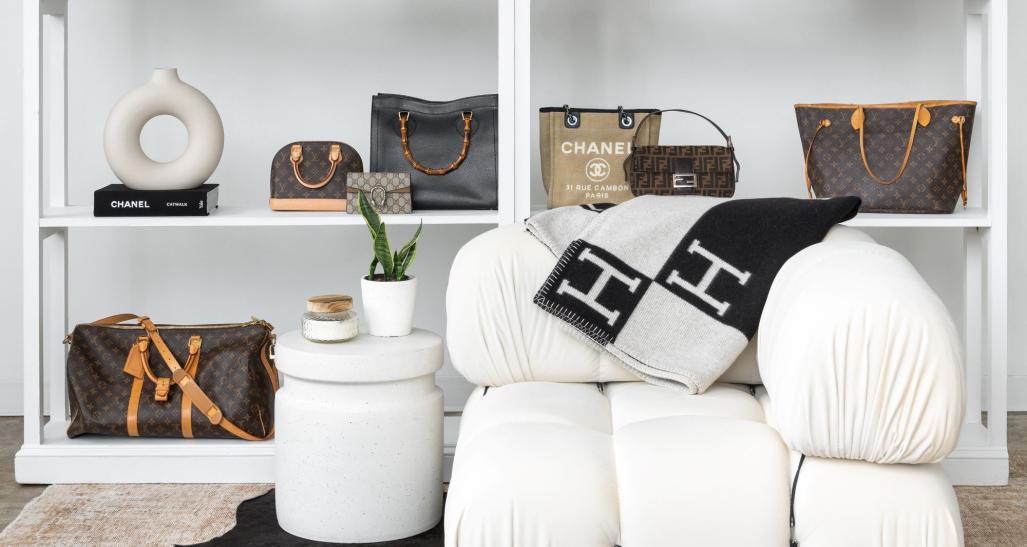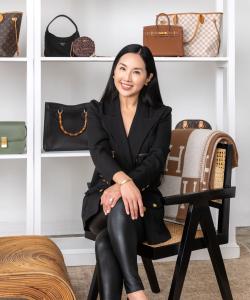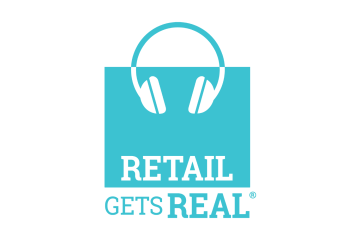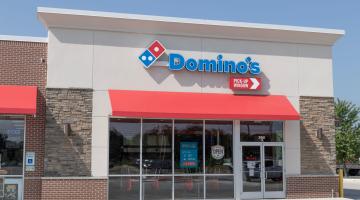
Entrepreneur Emily Erkel admits she is very risk-adverse.
“I attended zero entrepreneurial classes at Columbia Business School because I had no desire to be an entrepreneur,” Erkel says on this episode of Retail Gets Real. “I was like, ‘That’s too risky.’ I won’t ride roller coasters. I’m kind of scared of flying.”

Nudged on by her sister Elise Whang, Erkel left a budding career in the fashion industry to start their first business, Snob Swap. “I was in the corporate career path. I was doing retail strategy consulting. I went to business school. I worked in-house at some luxury brands. I went to Gap and worked at Gap headquarters in San Francisco in the strategy group,” she says.
“But she convinced me because you could see how much potential and opportunity, and I realized it was where my passion lies.”
Their resale company was initially consumer-facing, but in 2018, the sisters decided to launch LePrix Wholesale, a business-to-business platform for retailers to source authentic, pre-owned luxury goods.
“From the inception, we always knew we wanted to help business owners. Especially, stores, retailers, and we initially thought we want to help them to sell,” Erkel says. “What we realized was they actually didn’t need the help selling. They needed the help sourcing.”
LePrix sources luxury inventory from around the world, from carefully vetted sources. “We only hand-select a few suppliers and then we allow them on our platform. We already know that they authenticate that bag or whatever they’re selling, one to two times. We know their process. We know their team. We visited their facilities. We know their offices,” she says.
After an item is sold, it goes to LePrix for authentication before delivery. “We make sure it’s as described,” Erkel says. “That’s paramount because for pre-owned, a good condition could mean so many different things.”
LePrix also partners with independent, third-party authenticators like bababebi, Entrupy and Real Authentication. “They sit on millions and millions and millions of lines of data, and they understand the nuances of every single brand,” she says.
While investment handbags from Chanel, Hermes and Louis Vuitton are LePrix’s core offerings — aka the holy grail, according to Erkel — the ecommerce platform does also carry accessories and is branching out into fine jewelry and watches.
Read NRF's latest articles on the influential and inspiring women in retail.
“We’re focused on smart growth, scalable growth, but in a very profitable way. So, a path to profitability, making sure that we’re growing categories that make sense, growing our team, hiring the right people,” Erkel says.
“We’re in a place where I feel very fortunate that we’re focused on the right things. We’re getting our business organized. We’re growing really well. Our clients are growing well, which makes me so happy to hear.”
Listen to the full podcast to hear how the two sisters’ passion for vintage and consignment led to founding LePrix, why authentication is so important in the luxury resale marketplace, and what a risk-adverse entrepreneur recommends for someone who wants to start their own business.

The retail industry impacts everyone, everywhere, every day.
NRF’s podcast features unfiltered, insightful conversations with the industry’s most interesting people. Hear retail executives, industry experts, entrepreneurs and influencers discuss trends, their career stories and the future of retail.
Subscribe to NRF's Retail Gets Real podcast
Apple | Spotify | Google
Bill Thorne: Welcome to Retail Gets Real, where we hear from retail’s most fascinating leaders about the industry that impacts everyone, everywhere, every day. I’m Bill Thorne from the National Retail Federation, and on today’s episode, we’re talking to Emily Erkel. She’s the co-founder and CMO of pre-owned luxury wholesaler, LePrix.
We’re going to talk to Emily about the resale landscape, evolving her business for today’s demands, her team’s focus for the coming year, and what the future of retail really looks like. My colleague, Susan Reda, talked with Emily in July at NRF Nexus. Susan. Take it away.
Susan: Thanks, Bill and welcome, Emily. Welcome to Retail Gets Real. I’m really excited to talk with you this morning. So, tell us a little bit about LePrix, how it works and why it’s evolved from the initial B2C version.
Emily: Sure. So glad to be here. Today we are the largest ... B2B wholesale platform for retailers to source pre-owned luxury. It’s a mouthful, but you think of us as the first tech platform that retailers can easily source preowned luxury from all over the world. It’s been an amazing journey, but it’s been a long journey too.
Like you said, we were initially consumer-facing. Many, many years ago our name used to be Snob Swap. Terrible name, but it was supposed to be very cutesy and tongue in cheek. We weren’t swapping anything. But my sister, Elise, who’s our co-founder and our CEO, she and I started this company out of our own personal passion for vintage shopping and thrifting.
And so many years ago — probably eight or nine years ago — we started Snob Swap and it was a platform bringing the best vintage and designer consignment stores online. Think of it as like a Farfetch for vintage and it was really cool.
Initially when we started — and that’s so funny because I was telling someone the other night about how we started — we hired a developer who’s amazing. He’s still our CTO today. We got very lucky.
We built the site, we launched it at 11 p. m. at night, and then we just watched to see what would happen. And we had zero visitors because that’s not how you launch. There’s more to building a company beyond just making it go live.
But it’s funny, because from the inception, we always knew we wanted to help business owners. Especially, stores, retailers, and we initially thought we want to help them to sell. When we were teenagers thrifting and consignment shopping, we became friends with a lot of the store owners, and these friendships grew into us thinking, “Why isn’t there a place to shop these amazing stores?”
That was the initial concept of Snob Swap back in the day. We had 500 different boutiques, some really amazing boutiques, like Decades in LA, Ina’s in New York. These are famous vintage consignment stores, Michaels [Consignment NYC].
What we realized was they actually didn’t need the help selling. They needed the help sourcing because a lot of the store communities, how they source is very piecemeal. They would ask our team, “Can you help us find a pre-owned Louis Vuitton Neverfull bag? Can you help us source more Chanel classic flaps? Can you connect us to this store? Does this item on eBay look real?” It became really obvious that sourcing was very painful, very time intensive, very risky.
What we did was about three years ago, we launched LePrix Wholesale. LePrix Wholesale is a marketplace for businesses to source from other businesses. Very simply put: Whether you’re a consignment store, or you’re a $2 billion-plus ecommerce player that has pre-owned, or you’re a wholesaler, or you’re a rental business, they can easily come onto our platform and find a huge depth and breadth of inventory of pre-owned luxury that’s global. Globally sourced from amazing suppliers that we thoroughly vet.
Our suppliers are B2B suppliers of pre-owned wholesale luxury and our customers are retailers. We are just the connector. Because before, they would either have to travel — if they knew who to source from. It was spreadsheets. It was — if they didn’t know who to source from — it was eBay and risking it. We wanted to make it easy for retailers to source efficiently and at scale and just make it a pain-free process.
Susan: You’re talking about luxury products. What products? Primarily handbags or is it a more diversified?
Emily: Most of our inventory is handbags, but we also have accessories. We have ready-to-wear. We’re launching fine jewelry soon, and we’re launching watches soon. There are so many different categories we can go into and different verticals, but right now we’re kind of focused on the pre-owned space. We haven’t even touched sneakers or furniture or cars. Right now, our focus is handbags and all the things like accessories, ready-to-wear jewelry and watches.
Susan: This is a true entrepreneurial journey starting the business. What are some of the proudest moments you have? And maybe turning it around, what is the moment where you thought, “Oh my God, we’re never going to make this work,” and it has worked.
Emily: I think when we were consumer-facing, that was tough. I mean, the concept was good, but what we didn’t do — and that in hindsight, I find a blessing — is we didn’t raise a ton of money like a lot of the consumer-facing pre-owned businesses. The resale businesses have raised hundreds of millions of dollars.
We raised seed rounds, really tiny, amongst friends and family because we want to keep it small. Test the concept. And in hindsight, I am so thankful because what happened is by testing and testing and testing, we found product market fit with LePrix Wholesale, and their growth has been exponential.
I’m so glad we didn’t raise because we would be stuck doing a consumer-facing business. That’s really hard and we wouldn’t have found what the true need of the industry — for [what] pre-owned really needs. They really need help sourcing. You’ll ask any pre-owned business owner, whether they’re the CEO of a large resale company or a consignment store owner that’s mom-and-pop, the hardest thing is getting the right supply. The key to success is having the right supply.
Susan: The right supply in resale means it’s authentic. I think that’s at the heart of what LePrix has made so amazing for its partners. Tell us a little bit about how you actually go through the process of authenticating a Birkin.
Emily: The key to success obviously in resale is — authenticity is way up there. If it’s not authentic, it’s not good. We have a really strict process.
You think of LePrix, and you think it’s a tech platform and it’s B2B marketplace connecting suppliers and retailers. We’re like tech plus services. [Ex] A retailer sources on LePrix. Let’s say they buy a pre-owned Birkin 35 bag.
First of all, we always ensure all of our suppliers are thoroughly vetted. We only hand-select a few suppliers and then we allow them on our platform. We help put their inventory up. We already know that they authenticate that bag or whatever they’re selling, one to two times. We know their process. We know their team. We visited their facilities. We know their offices.
We already know that it’s authentic going up. But let’s say a retailer buys that Birkin on our platform. They bid in one of our many auctions, or they buy on our ecommerce, like the “add to cart” part of our platform. However they buy, that item is confirmed and then it’s sent to our offices in Bethesda, Maryland.
We’re right outside D. C. We have an amazing team of operations inspectors and authenticators. And that Birkin goes through an inspection process. We make sure it’s as described. For pre-owned, that’s like paramount because for pre-owned, a good condition could mean so many different things. But we want to make sure it’s as described, that there’s not any additional holes or scratches or mold. There are some things that you find and you’re like, “No, this does not pass inspection.”
We ensure it’s as described and then we go through the authentication process. We partner with the best third-party independent, like the gold standard of authenticators in the industry. For Hermes, it’s like bababebi. For Louis Vuitton, Chanel, Entrupy, Real Authentication.
The reason we partner with these businesses is their expertise. They sit on millions and millions and millions of lines of data, and they understand the nuances of every single brand. For example, an Entrupy device scans hyper-macroscopic visuals. You will take the device and you can scan the leather, the hardware, the stitching. You scan every piece of the bag, the serial number. If it’s a Birkin, the date code, the atelier’s initials. They can tell that a bag is authentic that way.
Plus, when you have the bag and our team — they’ve seen millions of bags — they can touch and feel and immediately know, “Something’s off with this, but let me get a third-party authenticator to also validate, if it’s authentic.”
Susan: It’s interesting because as a consumer, if I get burned on purchasing what I thought was a vintage bag, I’m never going to shop that retailer again. I’m angry. But for you, you’re dealing with much bigger client base, so you don’t want the retailer to end up being the one who doesn’t want to come back. Or the partner who doesn’t want to come back because of the mistakes in authenticating.
Emily: There have been people who’ve suggested, “Why don’t you just authenticate 10%? Just like random 10%?” It’s not part of who we are. Every item has to be authentic because our reputation and our customer’s reputation is fully reliant on authenticity, guaranteed.
We’re really strict about it. Our suppliers are really strict about it. We touch and feel everything. Not only do we do that in our Bethesda office, but we also have a Paris office now that we opened last summer and they do the same thing. For our European clients and for our U.S. clients and our global clients that go through our U. S. office, everything is touch inspected and authenticated.
Susan: Let’s turn the clock way back. What was it that made you get so interested in luxury and vintage? Was there, at the time, one thing that you thought was so coveted that you wanted it.
Emily: First, my co-founder is my older sister, so she’s very influential when you’re a girl growing up, and she loved vintage. I remember her bringing me to the first vintage store. At first, I was like, “Why would we buy something used?” It was like that stigma back in the day. Then she showed me not only the beautiful Chanel vintage bags that the store had, but the price of it was two-thirds, or a third of what you would buy at retail.
Back then it was — I’m going to age myself — but it was early 2000s and it was really exciting, to be able to eventually think I could afford something like that, even from a vintage store. I was pretty young. She was very influential and she still is to this day.
I was in the corporate career path. I was doing retail strategy consulting. I went to business school. I worked in-house at some luxury brands. I went to Gap and worked at Gap headquarters in San Francisco in the strategy group.
The whole time we were like ruminating on this concept, then we launched it on the side and she’s like, “Go full-time with me. Go full-time with me.” She’s like, “Do it.”
I was very risk-adverse. I attended zero entrepreneurial classes at Columbia Business School because I had no desire to be an entrepreneur. I was like, “That’s too risky.” I won’t ride roller coasters. I’m kind of scared of flying.
But she convinced me because you could see how much potential and opportunity and I realized it was where my passion lies. That’s kind of where we ended up.
Susan: Perfect. What are you focused on right now with LePrix? Where is the business at now and where do you want to take it over the next two to three years?
Emily: We’re focused on smart growth, scalable growth, but in a very profitable way. So, a path to profitability, making sure that we’re growing categories that make sense, growing our team, hiring the right people. Scaling smart in a very smart way. I think that’s important.
The general kind of macroeconomics and the roller coaster that’s been the last year or so, I think that’s probably where a lot of business leaders are thinking — very smart growth. For us, it’s at one point we’re like, “OK, maybe we’ll raise a series A,” and we had metrics to be able to. We were totally [indistinguishable] online investors and it would have been fine.
[But the] macroeconomic situation kind of turned. We were like, “You know what? Let’s figure out how to grow in our smart way and just run our business.” So that’s where we are today. Actually, again, sometimes I feel like the challenges are actually blessings in themselves.
Maybe nine years ago, if we had raised, we wouldn’t be here where we are today. Same thing now. We’re in a place where I feel very fortunate that we’re focused on the right things. We’re getting our business organized. We’re growing really well. Our clients are growing well, which makes me so happy to hear when our clients do well.
Especially when our clients — either they launch pre-owned or they’re growing their business — it doesn’t matter if they’re a $2 billion plus ecommerce player or they’re a small mom-and-pop, just hearing that they’re able to achieve that, it brings me joy.
Susan: You said that as an entrepreneur, you initially were risk-averse. But what would you recommend to somebody who’s out there with a great idea right now? How can you encourage them to just step in and make it happen?
Emily: I would say do the homework. Make sure that you understand the market, you understand the customers, you understand the demand, but don’t get stuck on it. If you in your gut know that this idea is going to be a highly successful idea, and you do your research and you did your homework, then just do it.
My sister actually reminded me of this quote our grandma used to say, “Time waits for no one.” The worst regret you’ll have is not doing it. You lose every game you don’t play. You hear all those different quotes, but it’s true. If you don’t try, you’ll never know. At least say you tried because there’s no losing if you said you tried your best.
Susan: Where’s the customer’s appetite right now for luxury? Because obviously we’re in an economic ebb-and-flow. As somebody who’s looking primarily at that customer base, are they still buying?
Emily: They are. They’re still buying. They’re buying different ways but they’re definitely buying.
It’s so funny how they’re buying too. During the pandemic there was a boom — just a flurry of customers buying everything, even, obviously pre-owned. I give the example of [for] two years, we could not keep a pair of Chanel gold earrings on our platform in stock for long because it was so hot and everybody wanted it and they’re paying a premium.
Then that kind of ebbed and flowed and now people are looking at different things. They’re looking at more unique vintage styles. They’re looking at investment bags. Investment bags — we call them the holy grail — Hermes, Chanel, Louis Vuitton. The core styles of those because they hold their value.
It’s funny because there is different kind of industry trends, product trends, but there’s definitely a strong consumer appetite and it continues to grow.
I mean, Millennials and Gen Z. I spoke recently at a university, and I asked the Gen Z students, “How many of you shopped vintage or pre-owned in the last month?” All 100 of them raised their hand and I got all these tingles because I was like, “This is my people.”
They understand it and it’s not just the younger generations. It’s all generations and it’s really cool to see because it’s such great industry for sustainability. [Also] the customers welcomed often the discount because during tough times, resale still grows because they’re looking for a good deal and a good value. It’s one of the most resilient industries to be in and we’re lucky to be in it.
Susan: Emily, we’re here at NRF Nexus and I just wonder, what do you hope to take away from this event?
Emily: I would love to meet other retail leaders. It’s really interesting to see what they’re working on, different initiatives and projects. If we end up finding some partners, that’s great, but I’m looking for more just kind of cross sharing of knowledge and maybe make a few friends.
Susan: What’s that one piece of advice that you always offer? You shared your grandma’s advice and I think that’s amazing. Is there a quote on your desk that is your go to?
Emily: This is the quote on my desk: “Time waits for no one.” And ama is grandma in Taiwanese. Every time I change my notebook, I always have this quote. It’s just reminds me that life is short. You’ve got do what you’re passionate about and go after it hard.
Susan: Emily, thank you so much for joining us. It’s been a pleasure talking with you and I’m going to throw it back to Bill.


